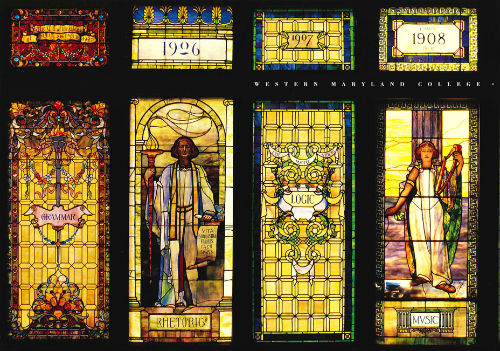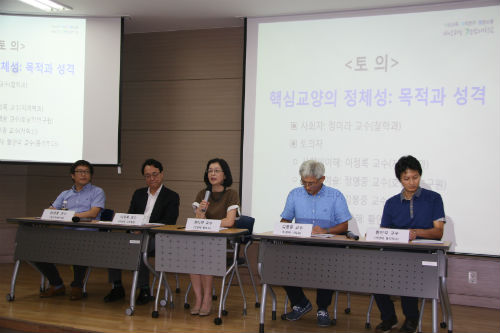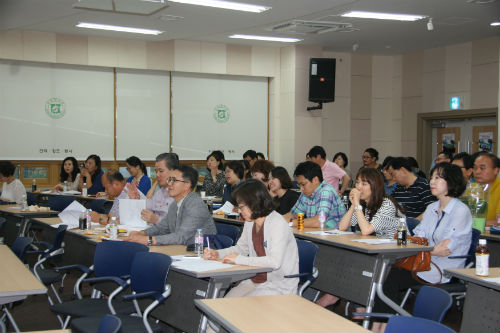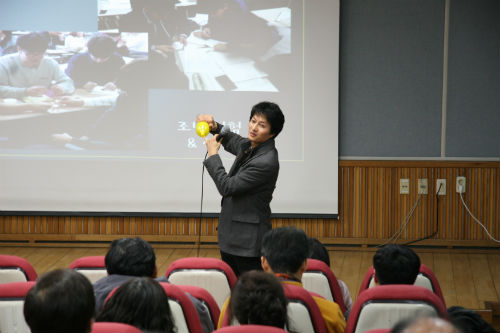
A few days ago, a student came to my office to get some advice from me. The student majors in business administration, but she is interested in screenwriting. Regardless of what she wants to do, she said that she would get a job in a company because she has to make a living. What could I tell her? The primary concern of all of university students is to get a job. However, today’s job market is becoming more and more competitive. Even the latest coined slang among young people reflects their gloomy views of their future: 'sampo-generation', (a generation that gives up romance, marriage and childbirth) and 'hell-Choseon' (a Korean society as miserable as hell), for example. Young people do not hesitate to choose a more practical career instead of chasing their dreams.
In this savage age, it is very hard to say that liberal education is necessary and important in our society. Many people think that liberal education has nothing to do with getting a job. This might be true, because liberal education does not normally provide any professional skills which are directly useful in getting a job.

When did this impetuous circumstance of Korean education start? It is important to understand that this circumstance is not confined to Korean society, either. We understand how majors are generally divided under the university system. First, they are usually separated into two large categories: the humanities and natural science. The humanities normally includes majors such as history, politics, economy, law, philosophy, and so on. Natural science includes majors such as physics, chemistry, biology, geology, mathematics, etc. Such a subdivision of knowledge is a typical characteristic of the modern education system received from the Western world since the Nineteenth Century. It can also be understood from the Korean word for 'science' itself. When the word ‘science’ was translated into kagaku (科學) in Japanese and then introduced into Korean during the early twentieth century, it literally meant subdivision (科) of knowledge (學). Since then, the subdivision of knowledge has been a main trend in the modern education system. The subdivision of university subjects has also strongly impacted the high school education system. Today, high school students must select one of two tracks, liberal arts or natural sciences. This subdivision of knowledge was born from social needs, and it produced professionals who achieved expert knowledge in their fields of study.
As a result, however, many harmful effects have occurred. It has deprived students of a chance to enjoy knowledge in its own right. In extreme cases, moreover, students no longer think that knowledge is a tool to help them realize their dreams. Instead, their dreams are cut apart and remeasured to fit into specific majors within the national education system. In addition, specialization in a capitalistic society has produced an era of division rather than unity among all areas of society, including the education system. C. P. Snow (1905-1980), a British historian, called attention to a huge gap between natural sciences and humanities, which pervaded through British society during the mid-twentieth century.

Personally, I have had a painful experience due to the division of the modern education system. I majored in the history of science. This field studies the two areas of natural science and history. For a long time, the history of science has been an anomaly in the institutional education system of the university, which has been based on separate majors. Many students are unfamiliar with crossing over borders within the established education system, just as most people usually have no interest in who lives in the apartment next to theirs. The descent of the Korean education system today, therefore, is the result of today’s modern education system. The rapid appearance of such buzz words as ‘Consilience’ and ‘Interdisciplinary’ show that people are realizing this serious problem that has resulted from the previous institutional system.
Why should the subdivisions of the modern education system be reconsidered? In other words, why should liberal education be strengthened in the university?
First, detailed research confined within a certain field of study by itself is not able to effectively solve various problems in our society. In the past, for instance, to build a nuclear power plant, the government and scientists rarely encountered strong resistance from the people. In the era of developmental dictatorships, only the rosy hope of science and technology was spotlighted. However, this is no longer the case. Today, to build a nuclear power plant, we have to resolve differences among local residents, environmentalists, ecologists, economists, and so on. It has evolved from a scientific issue to a social issue. Likewise, other than nuclear power plants, there are many issues that concern more than just scientists: GM (genetically modified) food, brain death and organ transplantation, global warming, etc. Therefore, our age needs intellectuals who are able to understand the various opinions surrounding these social issues. The previous major-oriented education system cannot fulfill these requirements in the future.

Secondly, students can develop an active desire for their learning through liberal education. Some major universities in foreign countries are reforming the old education system based on majors. For instance, The University of Tokyo has a program that allows students to study liberal arts for two years, and then select their major from their favorite subjects in their Junior year. For two years, students can research majors which they may become interested in. In the case of Korean universities, however, most university students begin their majors as soon as they matriculate. Is that a waste of two years at the University of Tokyo? I do not think so. If students cannot select their majors based on their aptitudes and interests, they will not know the joy of learning in the long run. Average life spans are getting longer and longer. If we forget the joys of learning at an early age, our future will be a painful process. If there is no joy of learning in the university, it might as well be a job training center.
Thirdly, liberal education is also important in terms of the productivity of knowledge in our society. Some people misunderstand that an emphasis on liberal education indicates negligence on the part of major-oriented education. Some also have the misunderstanding that liberal subjects are just basic knowledge needed before entering one’s major. However, it is a misunderstanding that major-oriented education can cover all the areas of knowledge which our society needs. Of course, we know that new subjects within the liberal arts should be developed. Many can be found in the gaps of knowledge between traditional majors. Today, new interdisciplinary subjects, which separate majors do not address independently, are becoming popular. Such subjects can positively influence older, more established majors. New ideas have often come from such interdisciplinary areas of study.
In conclusion, liberal education should be strengthened and encouraged in a way that can enrich the history of human knowledge.
By Kim Sung-khun, Professor, Institute of Liberal Education

